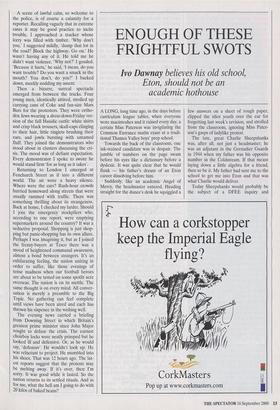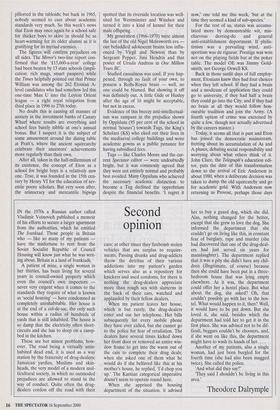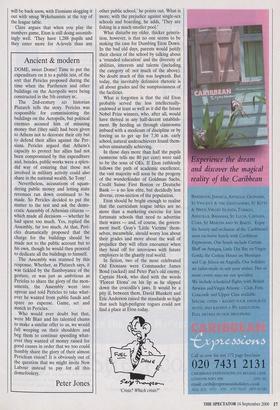ENOUGH OF THESE FRIGHTFUL SWOTS
No Dawnay believes his old school,
Eton, should not be an academic hothouse
A LONG, long time ago, in the days before curriculum league tables, when everyone wore macintoshes and it rained every day, a certain Miss Paterson was invigilating the Common Entrance maths exam at a tradi- tional Thames Valley boys' prep school.
Towards the back of the classroom, one ink-stained candidate was in despair. The jumble of numbers on the page swam before his eyes like a dictionary before a dyslexic. It was quite clear that he would flunk — his father's dream of an Eton career dissolving before him.
Suddenly, like an academic Angel of Mercy, the headmaster entered. Heading straight for the dunce's desk he squiggled a few answers on a sheet of rough paper, clipped the idiot youth over the ear for forgetting last week's revision, and strolled from the classroom, ignoring Miss Pater- son's gasps of ladylike protest.
The late, great Charlie Sheepshanks was, after all, not just a headmaster; he was an adjutant in the Grenadier Guards in 1944 when my father was his opposite number in the Coldstream. If that meant laying down a little algebra for a friend, then so be it. My father had sent me to the school to get me into Eton and that was what Charlie would deliver.
Today Sheepshanks would probably be the subject of a DFEE inquiry and pilloried in the tabloids; but back in 1965, nobody seemed to care about academic standards very much. So this week's news that Eton may once again be a school safe for thicker boys to skive in should be as heart-warming for its older alumni as it is gratifying for its myriad enemies.
The figures will confirm prejudices on all sides. The Mirror's two-line report con- firmed that the 115,660-a-year' college had been beaten by 13 state schools (impli- cation: rich mugs, smart paupers) while the Times helpfully pointed out that Prince William was among the 262 Etonian A- level candidates who had somehow led this one-time Man U into the Leyton Orient league — a right royal relegation from third place in 1996 to 27th today.
No doubt this is causing all manner of anxiety in the investment banks of Canary Wharf where results are everything and school fees barely nibble at one's annual bonus. But I suspect it is the subject of some amusement around the dining table at Pratt's, where the ancient squirearchy celebrate their ancestors' achievements more regularly than their own.
After all, taken in the half-millennium of its existence, the concept of Eton as a school for bright boys is a relatively new one. True, it was founded in the 15th cen- tury by Henry VI for the education of sev- entie poore scholars. But very soon after, the aristocracy and mercantile bigwigs spotted that its riverside location was well- sited for Westminster and Windsor and turned it into a kind of kennel for their male offspring.
My generation (1966-1970) were almost the last of the old Nigel Molesworth era our befuddled adolescent brains less influ- enced by Virgil and Newton than by Sergeant Pepper, Jimi Hendrix and that poster of Ursula Andress in One Million Years BC.
Studied casualness was cool. If you hap- pened, through no fault of your own, to possess a Rolls-Royce brain — well, no one could be blamed. But showing it off was definitely out. A little Gide or Huxley after the age of 16 might be acceptable, but not in excess.
Evidence of this breezy anti-intellectual- ism was rampant in the prejudice shown by Oppidans (95 per cent of the school in normal 'houses') towards Tugs, the King's Scholars (KS) who eked out their lives in the mediaeval college buildings and wore academic gowns as a public penance for having subsidised fees.
Tugs — like Charles Moore and the cur- rent Spectator editor — were undoubtedly bright, but it was commonly agreed that they were not entirely normal and probably best avoided. Many Oppidans who achieved the necessary academic distinction to become a Tug declined the opprobrium despite the financial benefits. regret it now,' one told me this week, 'but at the time they seemed a kind of sub-species.'
For the rest of us, status was accumu- lated more by demonstrable wit, mis- chievous derring-do and general anti-establishment deportment. If philis- tinism was a prevailing wind, anti- sportism was de rigueur. Prestige was won not on the playing fields but at the poker table. The model OE was Jimmy Gold- smith, not George Orwell KS.
Back in those sunlit days of full employ- ment, Etonians knew they had four choices when they left school. If they had a brain and a modicum of application they could go to university, if they had half a brain they could go into the City, and if they had no brain at all they would follow hon- ourable tradition and join the Army. (A fourth option of crime was exercised by quite a few, though not actually advertised by the careers master.) Today, it seems all that is past and Eton has joined the democratic mainstream, fretting about its accumulation of As and A pluses, debating social responsibility and worrying about what others think of it. John Clare, the Telegraph's education edi- tor, puts the date of this transformation down to the arrival of Eric Anderson in about 1980, when a deliberate decision was taken to dump the old squirearchy and go for academic gold. With Anderson now returning as Provost, perhaps those days will be back soon, with Etonians slogging it out with smug Wykehamists at the top of the league table.
Clare argues that when you play the numbers game, Eton is still doing astonish- ingly well. 'They have 1,288 pupils and they enter more for A-levels than any other public school,' he points out. What is more, with the prejudice against single-sex schools and boarding, he adds, 'They are fishing in a much smaller pool.'
What disturbs my older, thicker genera- tion, however, is that no one seems to be making the case for Dumbing Eton Down. In the bad old days, parents would justify their choice of the school by talking about a 'rounded education' and the diversity of abilities, interests and talents (including the category of: not much of the above). No doubt much of this was hogwash. But today, the inevitably defensive rhetoric is all about grades and the sumptuousness of the facilities.
What is forgotten is that the old Eton probably served the less intellectually- endowed at least as well as it did the future Nobel Prize winners, who, after all, would have thrived in any half-decent establish- ment. By herding us through classrooms imbued with a modicum of discipline or by forcing us to get up for 7.30 a.m. early school, natural underachievers found them- selves unnaturally achieving.
In those days more than half the pupils (someone tells me 80 per cent) were said to be the sons of OEs. If Eton ruthlessly follows the path of academic excellence, the vast majority will soon be the progeny of the wunderkinder of Goldman Sachs, Credit Suisse First Boston or Deutsche Bank — a no less elite, but decidedly less diverse, cross-section of the population.
Eton should be bright enough to realise that the curriculum league tables are no more than a marketing exercise for less fortunate schools that need to advertise their wares — and, of course, the govern- ment itself. Gray's 'Little Victims' them- selves, meanwhile, should worry less about their grades and more about the wall of prejudice they will often encounter when they head off for interviews with future employers in the ghastly real world.
In fiction, two of the most celebrated Old Etonians were Commander James Bond (sacked) and Peter Pan's old enemy, Captain Hook, who died with the words `Floreat Etona' on his lip as he slipped down the crocodile's jaws. It would be a pity if, between them, David Blunkett and Eric Anderson raised the standards so high that such high-pedigree rogues could not find a place at Eton today.
`Crisis? Which crisis?'




































































 Previous page
Previous page